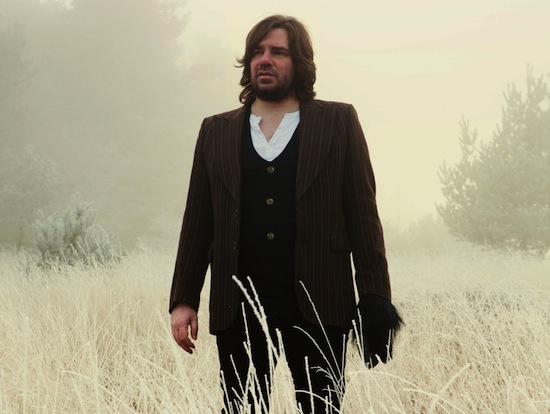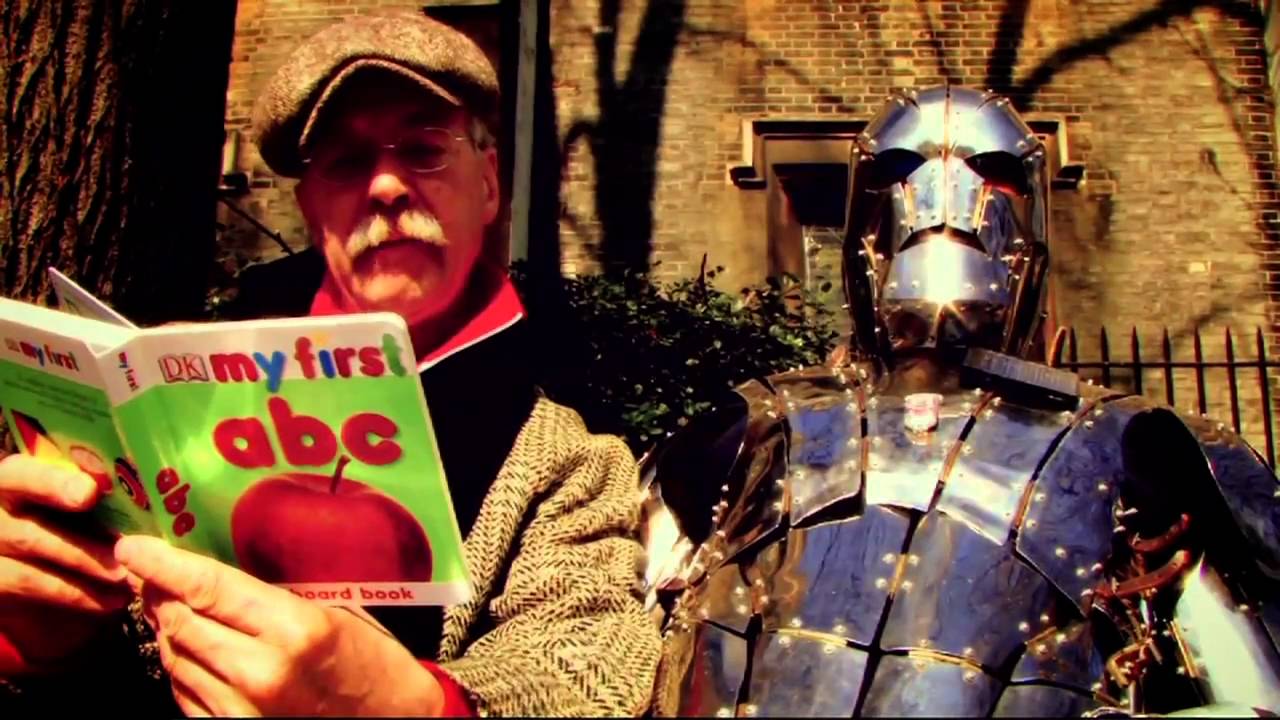Next week sees the release of Matt Berry’s fourth album, Kill The Wolf, out via Acid Jazz, and we’ve got a first play of the album in its entirety – have a listen below:
While his primary modus operandi is as a comic actor, taking up roles in various British comedies, most notably Garth Marenghi’s Darkplace, The Mighty Boosh and The IT Crowd, Berry’s also had a steady stream of excellent, idiosyncratic musical output. He produced all the music for Snuff Box the dark comedy he wrote with Rich Fulcher in 2003 (in an unexpected turn of events, legendary 70s R&B man Geno Washington played the show’s theme tune live with Berry and now includes it in his own sets), and soundtracked Steve Coogan’s Saxondale sitcom, as well as penning AD/BC: A Rock Opera with his The IT Crowd co-star Richard Ayoade. Having previously put out a couple of albums, Jackpot and Opium himself, he released Witchazel for a one-day free download in 2009 before it got a wider release via Acid Jazz in 2011.
Sonically, Kill The Wolf treads further down the path started with Witchazel, mixing early 70s psych-pop and pastoral folk, the latter putting him on similar terrain to Alexander Tucker and Hexvessel. His, though, is a thoroughly English version of the latter’s "forest folk", where sylvan myths get invested with Wicker Man-style occultism. It opens with the medieval overtones of ‘Gather Up’, where a lyrical urging to gather up the "lemon balm and henbane, mistletoe and mandrake, the pope and the nightshade" is accompanied by staccato guitar and flute and gilded by harp runs, while elsewhere ‘October Sun’s coda is rooted in a churchyard, though one where the chiming bells get undercut by elusive, vaguely sinister whispering voices. The album’s centrepiece is ‘Solstice’, a multi-part rumination on the year’s shortest day, which runs the gamut from music box magick and a multi-tracked incantation to “the black cloak of night”, through a middle section of windswept moor top synths and cymbal rolls before Berry cuts through the swirling mists for a closing three-minute guitar duel. It’s a good entry point for an album that matches a fascination with the wyrd and sheer deft musicianship (with a few exceptions Berry plays all the instruments on the album), pulled together with brilliant conviction.
We talked to Matt over the phone during his recent UK tour to ask him about the album, Mike Oldfield and devilry.
What’s your musical background?
Matt Berry: Well, I don’t read music, so it’s all done from an ideas angle – I couldn’t play other people’s stuff so I had to write my own as it were. I used to not really know any other people when I was young that wanted to play music – that’s why I learned everything myself. As a result, you kind of naturally become an engineer of sorts, because you’ve got to learn how to record everything. Needs must, I guess!
On your website, you tell the story of your friend having a momentary devilish flash which inspired this record, and on your previous albums there have been references to all sorts of satanic forces. Are you a believer in this type of thing?
MB: Well, I don’t know – it’s the kind of religious question, and my sober mind would tell me that it’s all bullshit, we’re no different than a dog – you don’t think about a dog’s afterlife! I mean that’s kind of where I am, but at the same time, things have happened like that incident that I badly wrote up on the website. That did happen, but there is evidence that there’s also a lot of logical reasons for that and other things like it.
There are a number of guest appearances on the album – how did they come about?
MB: Mark Morriss’ [of The Bluetones] singing quite a bit on it and he’s a very old friend. I’d always loved his voice and knew that I wanted him on it. And then there’s Eric Johnson from The Shins and Fruit Bats. Again, I’d always been a huge fan of his, I love his voice, he’s all over the album. I wrote something about him on Twitter when one of his albums came out and he got back straightaway, and said equally that he’d been watching what I was doing, we should do something. So as soon as I was putting this album together, he was the first person that I thought of. Alex Robertshaw’s [of Everything Everything] the same – I love his guitar playing. We knew each other and I thought it would be cool for him to do something that he doesn’t normally do, so that’s why the slide guitar fell out. He doesn’t do that in his band, and that’s great to hear him do something that you don’t normally hear him do – he’s an amazing technician and he’s a lovely bloke, so I was lucky to get him on there.
Could you talk me through the song ‘Solstice’? How did you piece it together?
MB: It was kind of a concept in my head to start with where I knew I wanted it to go from the shortest to the longest day and back to the shortest, so that kind of journey. That was what I had in my head and I had the imagery of what would happen on the way and then ending up where you first started off from. There’s a line about taking pleasure in the seasons’ change, which is very important to me, because, due to work, I’ve had to spend time in Los Angeles where there’s no change of season and I always end up thinking "I couldn’t live here". I need to see what what autumn looks like, I need to see these kind of changes. That was the main inspiration for it, really getting off on the fact that it’s starting to get colder and the leaves are changing colour, these really obvious things. The fact that it’s that long, I’ve never had this problem with things needing to be 2:50 or whatever; if it takes eight minutes to get the imagery across, then so be it, I think.
It feels like there’s a strong sense of place to the album. Did you hold any particular locations in mind when you were writing?
MB: It’s just the English countryside that makes a strong impression on you – for me, a mixture of Bedfordshire and the West Country, where I’ve seen the most extraordinary things outside.
There are lots of sonic snippets scattered around your two Acid Jazz albums – the madcap radio jingle on Witchazel’s ‘Take My Hand’ and the round at the end of ‘Knock Knock’ on Kill The Wolf – is this by design or the result of you cutting down masses of material?
MB: A lot of it is by design. Design to the extent where if you attempt something, if it works, great, if it doesn’t, that’s bad luck – I must have thought that those things worked, which is why they’re still in there! Something like ‘Knock Knock’, I was trying to do a Joe Meek, ‘Johnny Remember Me’-type thing. And also I wanted two drummers: I’d never done anything where two drummers were playing independently, that kind of Concert For Bangladesh, George Harrison-type sound, where there was Ringo Starr and that other drummer. I wanted that, and that was great fun, because I had my drummer and a mate of mine called Tony, who hadn’t heard what my drummer had done, did what he thought, and it had this massive sound, which is hard to contain, but I think it’s worked in the end.
What were your influences for the record?
MB: Stuff that is ambitious. Mike Oldfield was the first bloke that I heard doing music in the area that I’m interested in, but there’s all kind of things. The folk that you get on Radio 1 isn’t the sort of thing that I’m into, it’s kind of too uptempo and jaunty for me. I prefer a bit of atmosphere and a bit of darkness. The last new kind of stuff that really caught my attention was the first Fleet Foxes album, I thought that had a great atmosphere. I wasn’t that keen on the follow-up, but I suppose still was in love with the first one.
Do you think there’s a change in perception of people predominantly known for other things being accepted as musicians?
MB: It’s a British thing. You can be more than one thing in France, no one thinks anything odd about it at all. It is difficult to visualise someone doing more than one thing – it’s "hang on, this guy’s supposed to make me laugh – what’s all this music shit?" I don’t care about that, I always did it, so I can’t be spending any time on the English, British perception of someone cross-platform – I don’t know the official term!
I read a quote from you saying that, having recorded music when you were at university, you couldn’t take it seriously. Has that changed now? Do you take your music more seriously?
MB: What I would have meant – I always took the songs seriously, it was more how they were presented. The natural thing is to do a video, without any embarrassment, lip-syncing the song straight down the lens of a camera. Now, I find that so embarrassing, sort of ridiculous, I couldn’t take that seriously. The songs themselves, I work hard on them. You know, power to those that can do it; a lot of people don’t have any problem with that, but I would just feel like a dick I think!
Kill The Wolf is out next week via Acid Jazz; get hold of the album here



